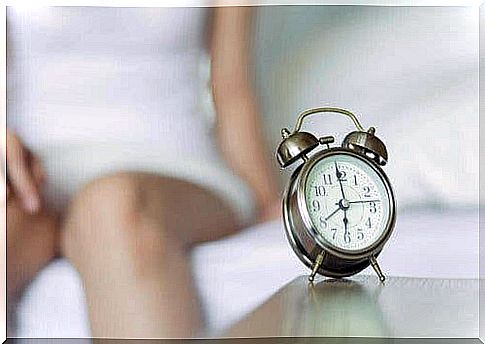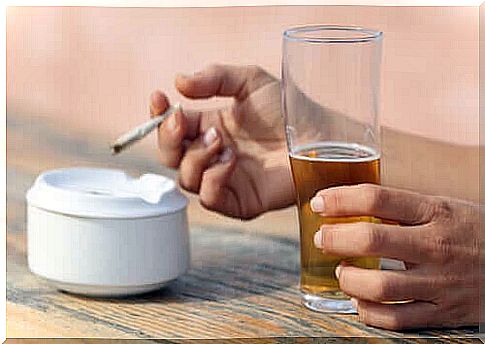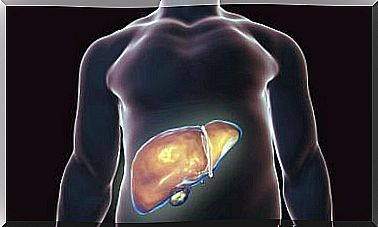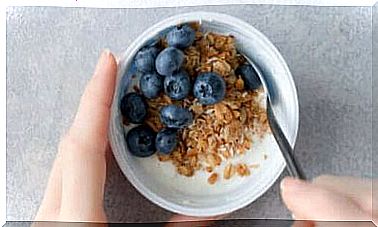Everything You Do During The Day Affects Your Rest

Proper rest is essential for the human body to function at full capacity. If you suffer from insomnia or sleep disorders, you’re probably desperately trying different tricks when you go to bed; drinking warm milk, listening to calm music and so on. But what you do throughout the day also has a huge impact on nocturnal rest; maybe even more than what you do in the evening just before going to bed.
What you do during the day affects your nocturnal rest
Sleeping is a fundamental physiological process designed to maintain the proper functioning of our bodies. It is a biological necessity aimed at:
- Restores the energy of the cells so that the cells oxidize and regenerate.
- Restores the homeostasis of the central nervous system and other body tissues to maintain their health so that they can function at full capacity.
So proper rest is essential to achieve the following:
- To regulate emotions.
- To ensure adequate learning and memory processes.
- To maintain optimal body weight.
- To regulate our internal temperature.
- To optimize hormone production.
- To keep our heart healthy in top condition.

What happens if we don’t sleep properly?
From the information above, it is certainly easy to understand that when we do not sleep well, our cells weaken and our bodies begin to fail. Such impairment of bodily functions can be detected, inter alia, in the following ways:
- Mood loss, confusion, apathy and irritability. Overall, we feel uncomfortable.
- Impaired concentration, memory and learning. We notice how our intellectual performance decreases.
- Fatigue and weakness. We have less energy during the day.
- Increase in body fat percentage. Our weight is rising.
- Blurred vision and photosensitivity. Our vision is deteriorating.
- Indigestion. The risk of constipation, diarrhea and flatulence increases.
- Premature aging and shorter life expectancy. Various long-term health problems begin.
When we don’t sleep properly, the risk of depression, anxiety, obesity, high blood pressure, cardiovascular disease, cancer, and diabetes increases, among other things. The risk of accidents also increases.
Everyday good habits that help you sleep better
Most people with insomnia or other sleep disorders try different ways to relax just before going to bed. They are definitely worth a try, but it’s worth remembering that what you do throughout the day also has a huge impact on your night’s sleep. If you’re also having a hard time getting good dreams at night, read on and we’ll give you some tips on what to do during the day and not to do.
Set a sleep schedule and always follow it
When we are not allowed to sleep properly, we easily find ourselves in a vicious circle with no regular schedules. To avoid this, one of the first steps to achieve better sleep hygiene is to set bedtime and wake-up times. On the first day you will be very tired, but persevere, for you will soon find that it is worth it.
Keep in mind that the quality of sleep is at its best between 11pm and 9am. This means you should schedule your sleep schedule in between.
Our metabolism (release of brain neurotransmitters, body temperature, melatonin levels, metabolic rhythm, and brain function) is ideal during that period to activate our daily functions and, so to speak, to reset our body. The body is programmed to be awake and active outside of this schedule.
Thus, bedtime and wake-up times should be within the aforementioned interval. The ideal number of hours of rest for an adult is 7-9 hours a day, depending on the individual.
And we must not forget that our own sleep schedule should also be followed on weekends, not just on weekdays. It may seem boring, but letting go of the schedule can drive you back into the vicious circle. Everyone should consider what is most important to them: to keep a good night’s sleep every night, or to enjoy the social events of the weekend at night and suffer from it on the weekdays to come.

Increase your physical activity during the day
Most people who don’t get to sleep properly feel very tired during the day. And it is no wonder, for the human body needs the energy given by rest to maintain its vital functions.
Lack of sleep limits our available energy and is not available for those activities that are not important to our survival. So our bodies ensure that the necessary functions are maintained, but then everything else, or “extra”, is more difficult. When we haven’t done anything extra during the day and have been pretty passive, we don’t have to get tired in the evening by going to bed because our bodies don’t even need it. The vicious circle is ready again.
This is how we then gradually change our inner clock, the one that regulates when we should sleep and when we should be awake and active. So the less we sleep, the more passive we become. And the more passive we are, the more we suffer from a bad night’s sleep. We always only go to bed later, we don’t get to sleep properly, and we wake up when it hurts.
This vicious circle can be broken by being active during the day. Again, the first day is going to be difficult, but you will probably notice the difference the very next day.
So adopt an active lifestyle and you will definitely sleep better.
Don’t sleep
As we just said, we need to be awake and active during the day to be tired in the evening and to be able to sleep well at night. Therefore, those who sleep poorly or suffer from sleep disorders should avoid sunburn. The more we sleep during the day, the less we sleep at night.
Taking a day’s sleep can undeniably help you feel better after a poorly slept night. A 2016 study published in the Journal of Neurology found that people who slept less than 7 hours a night and took a nap the next day felt about 20 percent better. However, this is unique, so you need to test how it works for you – for the better but for the worse in terms of night’s sleep. In addition, naps should not be long, but rest breaks of 15-20 minutes.
Follow a healthy and varied diet during the day
Adhering to a varied and healthy diet can indeed improve the quality of rest. This is because with the right kind of diet, we guarantee the intake of essential micronutrients needed to maintain the functioning of the central nervous system and to produce vital neurotransmitters.
In this sense, our main goal should be to ensure an adequate intake of tryptophan. Tryptophan is a precursor of serotonin and melatonin. The former is also known as wellness hormone, and the latter as sleep hormone. We also need enough carbohydrates to increase the bioavailability of tryptophan to the central nervous system.
In addition, we need to get enough Omega-3 fatty acids, magnesium, zinc, calcium and B vitamins. These help to relax the muscles and contribute to the proper formation of the neurotransmitters involved in sleep in our body.
Avoid tobacco and alcohol before going to bed
Recent studies show that smoking or drinking alcohol for another 4 hours before bedtime changes the quality of our sleep and makes it harder to get sleep. One likely consequence of this is that we wake up tired.
Tobacco is a stimulant, so it activates the central nervous system. This is exactly what we don’t want in the last hours of the day, just before bed.
Why?
The sleep hormone melatonin is only released when we are relaxed.
Alcohol, on the other hand, is known for its relaxing effect. But if alcohol is consumed in the evening before going to bed, it changes the REM phase of sleep. REM is the stage where our brains decide which data should be stored and which should be discarded.

Do not drink coffee after five o’clock in the afternoon
Coffee, several teas, and cocoa contain caffeine and theobromine, and we know these are stimulants. Therefore, their ingestion should be avoided after 5 p.m. Note that some people still feel their stimulating power up to 12 hours after ingesting them.
Keep electronic devices away from the bed
The use of electronic devices should be stopped 4 hours before bedtime.
The blue light on electronic displays activates retinal photoreceptors. They send the wrong message to the brain: that it’s time to wake up. That light also stimulates the area of the brain that is activated, for example, after a shock or shock. This increases the production of cortisol, a stress hormone, and blocks the production of melatonin, a sleep hormone.
Needless to say, our health should be a priority. However, if for one reason or another it is impossible for you to be without a smartphone, tablet or computer during the last hours of the day, at least adjust their settings. Most devices today have a feature that allows you to adjust the screen light to yellow.
Don’t play sports in the evening
As we mentioned earlier, physical activity during the day is very important for proper rest. However, sports performance and other physical activity should be performed in the morning or afternoon, as exercise raises cortisol levels and thus prevents the release of melatonin. And melatonin we need to sleep.
Pay attention to the right kind of dinner if you want to sleep well
A suitable dinner for a good night’s sleep is a low-fat meal. It should contain carbohydrates and a lot of protein, but not too many spices and especially sugar. Fat, sugar, and spices activate your metabolism, and in the evening, of course, you try to do the opposite.
Dinner must also be enjoyed at least two hours before bedtime. Then, when it’s time to go to sleep, your body is running at low power and you can sleep properly.
In addition, it is good to keep in mind that carbohydrates with a high glycemic index cause a peak in insulin, which in reasonable dimensions helps to deliver tryptophan to the central nervous system. Because excessive stimulation of the pancreas has a negative effect on insulin release, eating these foods at dinner requires a prior assessment of its risks and benefits, largely depending on the severity of the individual’s sleep disorders.
Eating melatonin-rich foods such as cherries, oats and bananas at dinner can reduce the time it takes to fall asleep and help you sleep deeper throughout the night.
You need to remember that what you do during the day affects your nocturnal rest. If you are not sleeping properly, try the tips in this article. After all, the instructions are quite simple: be active during the day, do not enjoy stimulants in the evening and follow a healthy diet.









